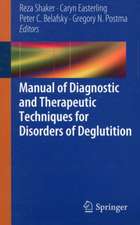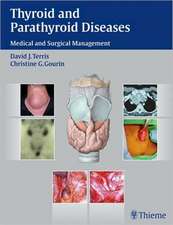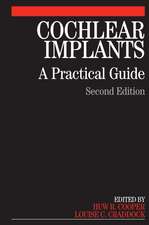The Evo-Devo Origin of the Nose, Anterior Skull Base and Midface
Autor Roger Jankowskien Limba Engleză Paperback – 23 aug 2016
| Toate formatele și edițiile | Preț | Express |
|---|---|---|
| Paperback (1) | 775.33 lei 6-8 săpt. | |
| Springer – 23 aug 2016 | 775.33 lei 6-8 săpt. | |
| Hardback (1) | 958.85 lei 39-44 zile | |
| Springer – 3 apr 2013 | 958.85 lei 39-44 zile |
Preț: 775.33 lei
Preț vechi: 816.13 lei
-5% Nou
Puncte Express: 1163
Preț estimativ în valută:
148.36€ • 153.90$ • 123.71£
148.36€ • 153.90$ • 123.71£
Carte tipărită la comandă
Livrare economică 27 martie-10 aprilie
Preluare comenzi: 021 569.72.76
Specificații
ISBN-13: 9782817805528
ISBN-10: 2817805526
Pagini: 210
Ilustrații: XIX, 210 p.
Dimensiuni: 155 x 235 mm
Greutate: 0.33 kg
Ediția:Softcover reprint of the original 1st ed. 2013
Editura: Springer
Colecția Springer
Locul publicării:Paris, France
ISBN-10: 2817805526
Pagini: 210
Ilustrații: XIX, 210 p.
Dimensiuni: 155 x 235 mm
Greutate: 0.33 kg
Ediția:Softcover reprint of the original 1st ed. 2013
Editura: Springer
Colecția Springer
Locul publicării:Paris, France
Cuprins
Introduction.- The primary nose and palate in evolution.- The primary nose and palate in human embryo development parallels between evolution and development of the nose.- The seemingly simple formation of the secondary palate and nose in the human embryo.- The complex formation of the secondary palate and nose in evolution.- Primary and secondary palates – primary and secondary nasal fossae.- Olfactory and respiratory nasal fossae.- Is the human ethmoid labyrinth a sinus?.- Understanding the anatomy of the human nose.- The nose in midface development.- Medical hypotheses and perspectives – evolutionnary & developmental (evo-devo) medicine.- Conclusion.
Recenzii
From the book reviews:
“The aim of this book is to provide an original understanding of the nose, midface and anterior skull base development based upon the evo-devo theory. … At the end of each part, a clear and concise summary underlines the key issues. … This original, attractive, and richly documented book will be of great value not only to all physicians and anatomists dealing with the nose and paranasal sinuses and also to those who are interested in general concept of evolution.” (B. Grignon, Surgical and Radiologic Anatomy, 2014)
“The aim of this book is to provide an original understanding of the nose, midface and anterior skull base development based upon the evo-devo theory. … At the end of each part, a clear and concise summary underlines the key issues. … This original, attractive, and richly documented book will be of great value not only to all physicians and anatomists dealing with the nose and paranasal sinuses and also to those who are interested in general concept of evolution.” (B. Grignon, Surgical and Radiologic Anatomy, 2014)
Notă biografică
Prof Jankowski is a member of the Executive Committee of the European Rhinologic Society; of the Preliminary International Faculty Board of the European Academy of Facial Plastic Surgery; and of the Scientific Committee of the French Society of Otorhinolaryngology. He also served as president of the French Society of Otorhinolaryngology’s working group for the Guidelines on Chronic Cough in Adults (2006).
Textul de pe ultima copertă
The phylontogenic theory proposes an original understanding of nose, sinus and midface formation and development by looking back in evolution for the first traces of the olfactory organ and then tracing its successive phyletic transformations to become part of the respiratory apparatus and finally the central point of human facial anatomy. Von Baer’s, Darwin’s, Haeckel’s, Garstang’s, Gould’s and Buss’ explorations of parallels between phylogeny and ontogeny help to trace the nose and midface story. The paradigm of existing parallels between ontogeny and phylogeny proves useful both in seeking to understand the holoprosencephalic spectrum of facial malformations (which represent radically different pathways of facial development after the life’s tape has been started to run again) and in formulating hypotheses on chordate to vertebrate evolution. The phylontogenic theory leads to new medical hypotheses on nose and sinus diseases and opens the field of evolution and development-based medicine.
Caracteristici
A revision of the classical representation of nose, sinus and midface evolution and development? New bases for understanding nose and sinus diseases and midface malformations A concrete example of the link between phylogeny and ontogeny in evolution










